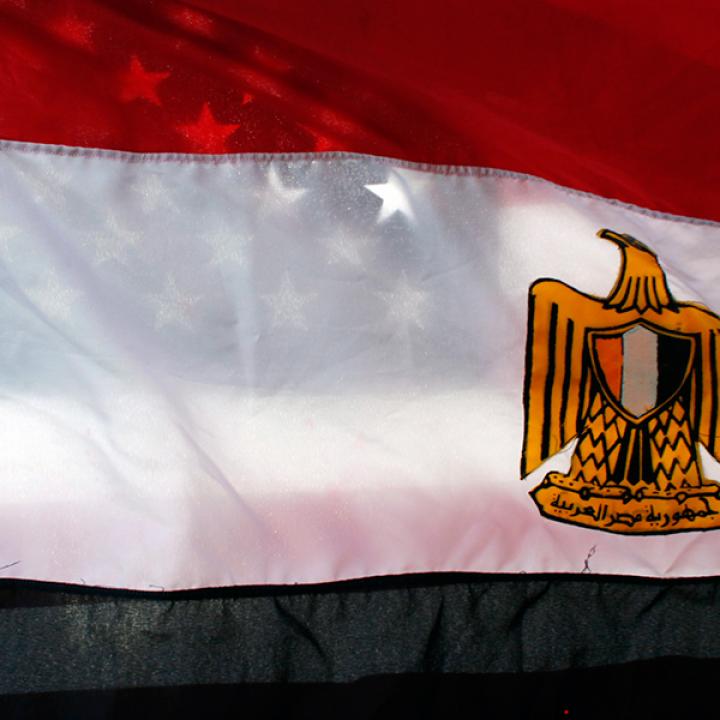

The recent suspension of U.S. aid to Egypt is a self-inflicted wound, but a flexible interpretation of the gesture and attention to Egypt's economic needs could soften its negative impact.
The decision by the Obama administration to suspend a large portion of U.S. military aid to Egypt is not productive, either for Egyptian democracy or for relations between the two countries. But since what's done is done, the question today is how Cairo and the rest of the region will react to this decision, and how both Egypt and the U.S. can best recover from this self-inflicted wound.
First, regarding Egypt, the Obama administration is either underestimating or miscalculating the response of its government and, even more important, of the Egyptian people. Background briefings described General Sisi's reaction as "friendly," and the Egyptian foreign ministry's reaction as "nonchalant." Such self-serving comments not only obscure the deep disappointment of Egyptian officials, but also entirely ignore the Egyptian public -- ironic for a U.S. administration that prides itself on promoting that public's interest. The reality, as most Egyptians and outside observers alike will attest, is that the U.S. is now viewed across the country as an unreliable or even hostile interloper. And many (though of course not all) ordinary Egyptians will see this latest move as further evidence that the U.S. still not-so-secretly supports the Muslim Brotherhood, which today is widely reviled in Egypt except among the small minority of its own hardcore adherents.
Given this popular atmosphere, Egypt's government will be compelled to respond with some form of nationalist backlash. Its foreign ministry spokesman has already declared that the aid suspension is "wrong and must be reversed." Its government-guided media are awash with anti-Obama headlines and images. And its most senior officials, whether military or civilian, are already busy visiting every foreign capital except Washington. The one thing that is not happening is the professed intent of the new U.S. policy: an improvement in Egypt's domestic political transition.
Nevertheless, Egypt understands the importance of the U.S.-Egyptian relationship and the special bond with the U.S. military. The Egyptian government will therefore not seek to undermine this relationship entirely, but will take some action to appease public opinion, signal its displeasure, and keep its options open. There are several things it could do, including a multi-billion dollar arms deal with Russia funded by Saudi Arabia. Fortunately, despite Washington's missteps, Egypt's peace with Israel is in no immediate jeopardy. It serves the interests of both countries, as well as of their foreign friends, whether in the region or further afield. But a prolonged U.S. aid cutoff would only encourage the anti-peace movement, not only in Egypt, but also in the Middle East as whole.
Indeed, other regional governments are responding to this latest twist in U.S. policy with barely disguised apprehension. The Saudis took the opportunity yesterday to reiterate their own strong support for Egypt's new regime. A senior Israeli official, who had just finished a speech noting the vital importance for the entire region of solid U.S.-Egyptian relations, and warning about the destructive intentions of the Muslim Brotherhood, offered no public comment when informed of the White House announcement. Privately, many regional officials and analysts shake their heads in wonder and dismay at the perceived U.S. penchant for undercutting its friends and accommodating its adversaries lately. Al-Qa'idah, Assad, Putin, Khamenei, and Hamas, they say, must all be chuckling as Washington pushes Cairo further away.
Going forward, however, much will depend on how the new decision, which explicitly leaves room for maneuver in the near term, is actually implemented. If the aid is reinstated in the next few months, as Egypt moves forward with its declared plan for a constitutional referendum and new elections, then the adverse consequences will be contained. But if the U.S. announcement's reference to "inclusive" democracy is interpreted to require unrealistic preconditions for restoring aid, like the reinstatement of Morsi or of Muslim Brotherhood dominance, then the U.S. and Egyptian governments will surely become seriously estranged -- and both will suffer serious and entirely avoidable damage as a result.
Another useful step the U.S. could now take would be to announce that as long as any military aid to Egypt is suspended, it will be reprogrammed as economic aid to support that country's hard-pressed population. This would take some of the sting out of Washington's punitive approach, and just possibly improve the credibility of the avowed American concern for the Egyptian people. Even with the U.S. government shut down and Congress gridlocked, it should not be beyond the wit of man to figure out how to put such an arrangement quickly into place.
But if the U.S. proceeds with an inflexible and impractical interpretation of its latest well-intentioned effort to spread the blessings of democracy abroad, the results are likely to be very bad for Egypt, for the region, and especially for American interests therein. Those with memories a bit longer than the current administration have seen this movie before. The starring role was played by Egypt's military leader of the time, Col. Gamal Abdel Nasser, who famously told President Eisenhower to take any conditional U.S. aid and "go jump in the lake." It took a generation of wars, Russian dominance in Egypt, desperate poverty, and increasingly repressive rule to get past that disaster. This historical analogy is of course imperfect, as all analogies are by definition. Yet it serves as an important cautionary tale to help guide the next fragile steps in the long, crucial and complex U.S.-Egyptian relationship.
Adel El-Adawy is a Next Generation Fellow at The Washington Institute. David Pollock is the Kaufman Fellow at the Institute and director of Fikra Forum.
The Hill




